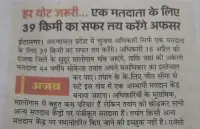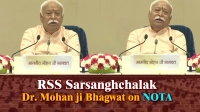India presents a challenge to most of the well-accepted notions of the modern world. Democracy is not an exception. While regarded as a successful democracy, in fact the largest working democracy, India faces several challenges in terms of the policies and quality of leadership yielded by democracy.
In contrast to the much apprehended majority-ism, Indian democracy ran for decades as a minority-appeasing one. As a matter of fact the notion of minority rights in India did not rise out of evil intentions but out of the apprehension that majority opinion will trump the minority interests. It is a different matter that such opinion in a pluralist and tolerant society like Indians will not give rise to such fears, but from a democratic viewpoint it at least has a rationale.
The consequence of such concept, namely deterioration of “taking care of small group interest” into group pandering, was partly a result of inexperience with democracy and partly result of lack of quality leadership. The effects of minority/group pandering politics in contrast to majority-ism are also quite visible – weak governments, hurdles in policy-making, lack of assertive national identity to mention a few.
On the other hand, a negative alternative of consensus to majority-ism emerged – populism. It turned out easier for leaders to keep manipulating public emotion with populist agenda at the expense of national welfare or long term interest. It appears not only is such populism electorally beneficial, but putting national interests higher than populism is electorally harmful. A classic case of contrast would be economic reforms of PV Narasimha Rao versus today’s food security bill. Even with NDA tenure, genuine work like employment generation or road project or control of interest rates etc did not end up with good electoral benefits. While they did the right things – to put curtail appeasement tendency, taking steps to improve national security, attempts in overcoming backwardness, it did not appeal much to people. On the other hand congress seems to successfully appeal to popular sentiment in various forms – occasional tickling of patriotic sentiment, doles and election freebies, glorifying backwardness (instead of helping it) and propping self-pity in large sections of the society. While the detail in this matter is large, a high level summary is enough to convey the point.
This rises some important questions: is populism at the expense of national interest indispensable to get votes in our democracy? Is populism really an opposite of national interest? Is it possible to reconcile these and create a democracy that is driven by national interests? (Although this may not be the problem of India alone, solving it for India is as good as solving for smaller/simpler democracies).
The answer to Indian problems as usual, is to be found in the Indian knowledge. The contention between what is attractive and what is in the real interests/welfare, the one between preya and sreya, is a concept well explained in tradition, both in the context of individuals and rulers. Understanding raja-dharma as per traditions will help us understand not only what to expect from rulers but also how to address such problems. What kind of ‘political model’ the texts recommend is a bigger topic, but what is relevant to us in this topic is how a democracy can be fixed to yield better results and whether such answers can be found in the long civilizational experience of Hindus.
Problem
For that we need to look at some very basic aspects of a ruler:
- Good ruler is one who pleases people with his rule – prajA-ranjakatva is the primary nature of a good rule.
- Ruler is like the father of people, the controller of land. He puts people in the right side, and punishes those in the wrong side of justice. People follow the king, and thus king is responsible for the conduct of people.
Many think that a democracy defies the basic principles of a kingship, and that it is a lot more evolved system. But as we can see from these two points above, democracy or kingship or any other form of governance is just a means – the basics of running a country in its good interests do not change. It is because they do not change, that they become part not of a temporal knowledge but of a permanent knowledge.
Whether democracy is used to achieve these two or to evade these selectively or to pretend pitting one of these against the other, determines how healthy a political system is. Is our democracy achieving these?
Six decades after independence, people hardly think cong rule is ‘pleasing’ – on the contrary the expectations have been lowered. From thinking of ourselves as among world’s most prosperous and the most resilient nation just out of colonial rule, to a meek struggling backward one. From expecting a clean and inspiring leadership from Hindu politicians who are supposed to be the world’s greatest statesmen and thinkers, to ‘everyone is bad, choose the better of two evils’. From a nation prospering with its own will to ‘can we ever prosper’ and a nation whose majority is discouraged from inspired hard work. Neither national security nor crime control nor economy looks any ‘pleasing’. In short, the Indian common man is pushed down into a state of tamas where he cannot even expect a happy nation but remains content with doles to give up such expectations.
The second aspect, namely control. As is visible, in six decades crime and corruption, encouragement to opportunism, immoral and illegal conduct flowed down from the top. Are people encouraged to be honest and upright in this country by the governance? Are people encouraged to be self-reliant in the country by the governance? Are people encouraged to be proud patriots in this country? Do the country’s security personnel and bureaucrats who do their duty feel rewarded for their honesty? Do people feel threatened to be on the wrong side of any of these? Thus Indian democracy as it stands today, fails even the second basic aspect of governance.
Roots
Any solution requires a correct diagnosis of problem. We need to realize that the seeds of bad rule are not in the deterioration of congress but in its advent. A consequence of Gandhi’s policy and decisions (though not vision or ideology) can only be a Nehru, and a consequence of Nehru can only be today’s congress. It is not in spite of them, but because of them that we see the country in this situation today.
Regardless of Gandhi’s high personal integrity, his ideas and actions contradicted each other in the most fundamental ways, consider three:
- his conception Hind swaraj/swadeshi and his choice of Nehru as a successor who was opposed to such concept
- his conception of Rama Rajya where people’s interests are primary, versus the appeasement of Muslim movement he did at the expense of national and Hindu interests that he sought to represent
- of course, his misuse of veto power against the democratic choices of congress to snub down able leaders and foist choices like Nehru – a complete anti-thesis of Rama rajya
Thus in Gandhi’s life time he laid no strong foundation for a nation that realizes his ideas, but in fact his choices of policies and successors were quite the opposite. Today (as it always was) it is the Hindu nationalists whose policies are rooted in swadeshi, Rama rajya and non-appeasement, while congress is happy with empty symbolisms of khaddar, charkha and iftar parties all the while misappropriating the name of Gandhi. But which one did Gandhi go with, given all his good intentions (and lack of political acumen)? If a nationalist like Gandhi can go so fundamentally wrong, it is not surprising that the next generation will only get as worse as Nehru showed in his life time – being defensive and ‘non-violent’ in matters of diplomacy and national interests, and aggressive and violent against political opponents.
Thus the two aspects of good ruler we considered are defeated in the very advent of congress, whose result is seen in today’s democracy.
Solution
The solution lies in realizing good governance and rulership as the goals and identifying democracy as an instrument to achieve those. Solution lies in replacing culture of negativity-based-consensus (which uses populism, appeals to self-pity, insecurity etc) with a culture of positivity-based-consensus (which uses majority-ism, appeals to national pride, self-reliance and progress). Solution lies in making people proud of their country and thus generating a consensus on matters of national importance.
Of course, to achieve this is easier said than done. Restoring positive sense of popularity as a guiding principle of democracy requires that strong an inspiring leaders emerge from time to time. In fact it is the sidelining of such leaders and their scarcity in recent decades that caused the positive sense of nationalism which prevailed by the time of independence to deteriorate into present day populism.
The one post-independence movement that attempted to turn the tide of self-pity by an assertion of Hindu nationalism is the Ayodhya movement. While it means many things to many people, its role in turning the tide of minority-ism and populism into a positive assertion of Hindu national identity is unquestionable. Even when it gave its positive dividends in many different forms, its political mileage was derived by BJP and Shivasena, but that inspiration did not go very far as the leadership BJP presented to the country was not magnetic and inspiring enough. It was the strength in the cause and not the loftiness in leadership that made people support the BJP. Vajpayee, however committed and patriotic, hardly fit the bill for the required order. For two decades the lack of an assertive leadership kept haunting the BJP. To be fair it is not that BJP leadership is in anyway less assertive or capable than congress leadership – it is any day far better than what congress could ever offer. But it remained short of what would be required to create the necessary positive inspiration.
The other prerequisite in bringing a consensus of positive nature is restoration of common man’s trust in the official system – judiciary or security or executive. Erosion of trust is not very difficult to achieve as congress did, but it is quite difficult to create or restore the trust. The attempt of congress and media over years was in a very easy direction – to show that BJP is imperfect in creating such trust. It is not just their dishonesty or hypocrisy to not look at the positive side, it is their basic policy to harp on the negative. Therefore to create a feeling that corruption is endemic for instance, is sufficient for them since their emphasis is not in a system that minimizes corruption. Same with issues of national security or demographic problems. The fact that there are scams and crimes at the highest level but not many have been convicted, is a moral victory of congress and media over the nationalists. A corrective to this too, comes not from eliminating crime completely, but through the salutary effect that can be achieved through convictions in some important matters. The real necessity after all is not conviction in every crime but the change in the atmosphere and creating fear in the criminals.
Are we anywhere near?
While the congress could set a new low every successive term it came to power, fortunately the improvement in positives on the other side is also encouraging:
- BJP to some extent succeeded in bringing both positivity and showed the need to create consensus on a positive note. It created good examples of governance in Gujarat, Chhattisgarh, Madhya Pradesh and Goa.
- Modi is seen as an assertive, forthright and non-apologetic leader, something BJP badly needed for a while. His popularity is not surprising, given the above backdrop.
- The Gujarat riot convictions and 2G convictions have gone a long way in restoring public trust in judiciary, at a time when public discourse was full of rhetoric of despair. The fight put up by IB and BJP in the fake encounter cases did put congress in defensive, thereby creating respect for India’s intelligence in people as well as presenting themselves as interested parties and stakeholders in national security.
It remains to be seen how far they work in achieving a democracy of positive consensus.





Leave a comment